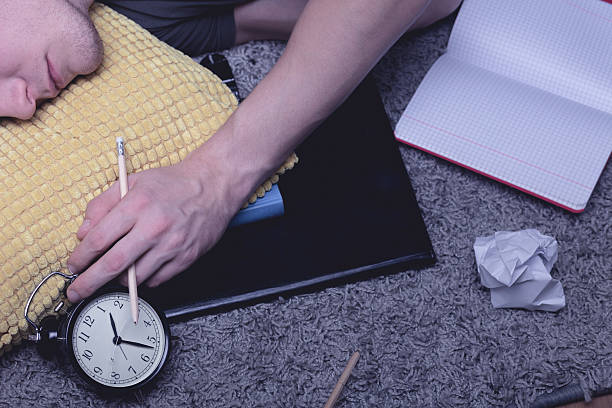As a student, you may be on a strict deadline, leaving you with no choice but to learn how to pull an all-nighter—a practice that involves staying awake throughout the night to complete academic tasks.
Pulling an all-nighter has become common for many individuals trying to meet deadlines, cram for exams, or complete urgent tasks. While this practice may seem exhausting, there are effective strategies that can help you stay through the night and optimize your productivity.
In this article, we will explore the strategies and techniques that can help you overcome the challenges of an all-nighter while optimizing your productivity and minimizing the effects on your well-being.
What is an all-nighter?
As mentioned earlier, an all-nighter entails staying awake throughout the night without taking any sleep breaks. It is often resorted to when faced with looming deadlines or pressing tasks that demand immediate attention.
By sacrificing sleep, individuals aim to gain additional hours to complete work, study intensively, or fulfil their commitments.
However, it is essential to note that all-nighters should not be a regular occurrence, as prolonged sleep deprivation can harm physical and mental well-being.
Related Post: 19 Creative White Dress Halloween Costume Ideas
Best Tips on How to Pull an All-Nighter
Here are the best tips to pull an all-nighter:
- Plan and prioritize
Before embarking on an all-nighter, create a detailed plan of the tasks you need to accomplish. Prioritize them based on urgency and importance, allocating sufficient time to each task.
This structured approach will help you stay focused and prevent wasting time on less critical activities.
- Optimize your environment
Create an ideal study or work environment to enhance your productivity during the night. Ensure that your workspace is well-lit, organized, and free from distractions.
Minimize external disturbances by informing those around you about your intention to pull an all-nighter.
- Stay hydrated and nourished
Proper hydration and nutrition are crucial in maintaining energy levels and cognitive function. Consume a balanced meal before starting your all-nighter and keep healthy snacks and beverages nearby to sustain your energy throughout the night.
Avoid excessive caffeine consumption, which can lead to jitteriness and disrupted sleep patterns once the all-nighter is over.
Related Post: 15 Best Colleges For Athletic Training In 2024
- Take short breaks
While it may seem counterintuitive, taking short breaks at regular intervals can boost your productivity. Engage in brief physical activity, such as stretching or walking, to refresh your mind and alleviate physical discomfort.
Remember to time your breaks to ensure they don’t become lengthy distractions.
- Utilize effective study techniques
When studying during an all-nighter, it is essential to employ efficient revision strategies. Techniques like active recall, spaced repetition, and summarization can help you retain information more effectively, allowing for more efficient studying.
- Manage your time wisely
Time management is crucial during an all-nighter. Break your tasks into smaller, manageable chunks and allocate specific time slots to each. Utilize productivity tools, such as time-tracking apps or the Pomodoro Technique, to stay on track and maintain a sense of progress.
- Engage in stimulating activities
Engage in stimulating activities during your all-nighter to combat drowsiness and maintain mental alertness. Listening to upbeat music, engaging in lively discussions with fellow night owls, or working in a well-ventilated room can help keep your mind active and prevent monotony.
Related Post: 25 Best Religiously Affiliated Colleges in the World | 2024 Rankings
- Practice good posture
Sitting for prolonged periods can lead to fatigue and discomfort. Maintain good posture throughout your all-nighter to minimize physical strain. Sit in an ergonomic chair, position your computer at eye level, and take short breaks to stretch and realign your body.
- Use natural light or bright light sources
Exposure to bright light can help regulate your internal body clock and enhance alertness. Work in a room with natural daylight or use artificial light sources, such as a bright desk lamp, to simulate daylight. This can help ward off drowsiness and increase your overall productivity.
- Stay motivated and positive
Maintaining a positive mindset and staying motivated can significantly impact your ability to pull off a successful all-nighter.
Remind yourself why you must stay awake and the benefits you will reap from completing your tasks. Celebrate small milestones to keep your spirits high and your momentum going.
Related Post: Certified Student Loans vs Uncertified Private Student Loan | All You Need to know
What to Avoid During an All-Nighter
While pulling an all-nighter can be a temporary solution for meeting deadlines or completing urgent tasks, certain pitfalls should be avoided to ensure optimal results. Here are some things to steer clear of during an all-nighter:
- Excessive consumption of sugary or processed foods: Although relying on sugary snacks or processed foods may be tempting for quick energy boosts, they can lead to energy crashes and decreased productivity in the long run. Opt for healthier alternatives like fruits, nuts, and whole grains to sustain your energy levels.
- Procrastination and distractions: All-nighters are time-sensitive, so avoiding unnecessary distractions is crucial. To maximize your efficiency, minimize your use of social media, turn off notifications, and focus solely on the task at hand.
- Inadequate breaks and rest: While staying focused during an all-nighter is important, neglecting to take adequate breaks and rest can hinder your cognitive abilities and overall performance. Be mindful of your physical and mental limitations and incorporate short breaks to recharge yourself.
- Over-reliance on caffeine: While a moderate amount of caffeine can help you stay awake and alert, excessive consumption can lead to jitteriness and restlessness and ultimately disrupt your sleep patterns once the all-nighter is over.
Limit your caffeine intake and explore alternative methods of maintaining wakefulness, such as staying engaged and active.
How to Stay Awake After an All-Nighter
Completing an all-nighter successfully is just half the battle. Once the night is over, finding ways to stay awake and function effectively during the day is crucial. Here are some strategies to help you combat sleepiness and remain productive after an all-nighter:
- Power napping: If circumstances allow, a short power nap of around 20-30 minutes can temporarily boost energy and enhance cognitive function. However, be mindful not to exceed the recommended duration, as longer naps can make you dizzy and disrupt your sleep schedule.
- Exposure to natural light: Sunlight is a powerful regulator of our internal body clock. After an all-nighter, spend time outdoors or near a window to expose yourself to natural light. This will help signal to your body that it’s daytime, promoting wakefulness and reducing drowsiness.
- Stay physically active: Engaging in physical activity, such as going for a brisk walk or doing light exercises, can stimulate your body and mind, helping you stay awake and alert. Incorporate movement breaks into your day to combat post-all-nighter fatigue.
- Stay hydrated: Dehydration can exacerbate feelings of tiredness and lethargy. Make sure to drink plenty of water throughout the day to maintain optimal hydration levels and support your body’s functions.
- Avoid heavy meals: Large, heavy meals can induce feelings of drowsiness and sluggishness. Opt for lighter, well-balanced meals that provide sustained energy without causing post-meal crashes.
Related Post: Can You Play Two Sports in College? All You Need to Know
How to Prepare for an All-Nighter
While pulling an all-nighter for school shouldn’t be a regular occurrence, there might be times when a deadline looms large and extra study hours are unavoidable. In such situations, proper preparation is the key to maximizing your focus and minimizing the negative effects of sleep deprivation. Here’s a comprehensive guide to ensure you tackle that all-nighter like a study champion:
Sleep (If Possible)
The ideal scenario before an all-nighter is a good night’s sleep – at least 7-8 hours. A well-rested brain absorbs and retains information more effectively. If a full night’s sleep seems like a luxury you can’t afford, prioritize a power nap of 20-30 minutes in the early evening. This short sleep burst can significantly improve alertness and cognitive function, giving you a much-needed edge for the long night ahead.
Fuel Your Focus with Brain Food
Skipping meals during an all-nighter is a recipe for disaster. Your brain, like any other high-performance organ, needs a steady supply of energy. Focus on brain foods like balanced dinner rich in complex carbohydrates and protein. Whole grains like brown rice or quinoa provide sustained energy release, while lean protein sources like grilled chicken or fish keep you feeling full for longer. Don’t forget the vegetables! They offer essential vitamins and minerals that support cognitive function.
Throughout the night, ditch the sugary treats and processed snacks. These might give you a quick pick-me-up, but they’ll lead to a crash in energy levels later. Instead, stock up on brain-boosting snacks that provide sustained focus. Fruits like berries and apples are packed with natural sugars and antioxidants that keep your mind sharp. Nuts, especially almonds, and walnuts, offer healthy fats and protein, promoting alertness and memory function. Dark chocolate, in moderation, can also be a helpful study buddy. Its natural stimulant, theobromine, can enhance focus and cognitive function.
Stay Hydrated
Dehydration is a sneaky enemy during an all-nighter. It can lead to headaches, fatigue, and decreased concentration. Make water your best friend! Aim to drink a glass of water every hour. Avoid sugary drinks and caffeinated beverages like coffee or soda before bed, as these can disrupt sleep patterns. If you do choose coffee or tea later in the night, opt for decaffeinated versions to avoid jitters and potential sleep disturbances when you finally crash.
Gather Your Study Materials
Before the study marathon, eliminate the chaos of scrambling for materials. Organize all your textbooks, notes, highlighters, pens, and any other resources you might need beforehand. Having everything within arm’s reach prevents wasted time searching and minimizes distractions.
Consider creating active learning tools like flashcards or mind maps. These techniques condense information visually, making processing and retaining crucial details easier, especially during sleep-deprived study sessions.
If technology aids your learning, ensure your laptop or tablet is fully charged. Access to online resources, study guides, or educational apps can be beneficial, but remember – the internet can also be a major distraction. If you find yourself getting lured away by social media or browsing unrelated content, consider website-blocking tools or apps to maintain focus.
Create a Study Sanctuary
Your environment plays a crucial role in your focus and productivity. Designate a clean, well-lit study space free from distractions. Turn off the TV, silence your phone notifications, and let your roommates know you’ll be in study mode. Good lighting prevents eye strain, so invest in a bright desk lamp if necessary.
Related Post: 15 Things Teachers Actually Do During the Summer for Fun
What are the risks to consider before pulling an all-nighter?
It’s not the same as staying up late or being a night owl. An all-nighter is when you don’t get any sleep at all. Before important tests, college students frequently stay up all night to get more study time in. To complete essays or presentations before the required date, they might also forgo sleep.
Sleep deprivation, even for only one night, can have a variety of detrimental impacts on the body and mind, including:
- Disruptions in the circadian rhythms that govern the natural sleep-wake cycle
- Feelings of irritability, anxiety, or depression
- Decreased attention span
- Compromised reaction times and coordination
- Problems performing complex tasks
- Poor judgment
The effects of being awake for 24 hours resemble those of alcohol consumption. A person who is extremely exhausted may also have microsleeps or unintended little periods of sleep.
For all of these reasons, people who plan to stay up all night should be aware that their likelihood of having a dangerous mishap increases when they are sleep-deprived.
Even though a person does not feel drowsy, driving, operating heavy machinery, or engaging in other safety-sensitive activities is dangerous when they are sleep-deprived.
Do All-Nighters Actually Work?
While all-nighters may seem necessary to meet deadlines or complete urgent tasks, their effectiveness is debatable.
Pulling an all-nighter can indeed provide a temporary extension of time to work or study, but the consequences of sleep deprivation can outweigh the short-term benefits.
Lack of sleep can impair cognitive function, memory retention, decision-making abilities, and overall productivity. It can also negatively affect physical health, such as weakened immune function and increased susceptibility to illness.
Related Post: 21 Affordable Braces for College Students: Achieve a Perfect Smile on a Budget
How to explore alternatives to All-Nighters
While these marathon study sessions might seem productive in the short term, they wreak havoc on your sleep, concentration, and overall well-being. The good news? There are far more effective ways to study for your exams and achieve academic success. Here’s how to explore alternatives to the all-nighter grind:
Embrace Time Management
Effective time management is the cornerstone of academic success. Don’t wait until the eleventh hour to crack open your textbooks. Plan your study schedule well in advance, breaking down large tasks into manageable chunks.
Allocate specific times for each subject and stick to your plan as closely as possible. Utilize tools like planners, calendars, or online scheduling apps to keep yourself on track. Short, focused study sessions spread throughout the week are far more effective than a single, sleep-deprived all-nighter.
Try the Pomodoro Technique to Work in Focused Sprints
The Pomodoro Technique is a time management strategy that can revolutionize your study sessions. Here’s how it works: Set a timer for 25 minutes and focus solely on the task at hand, eliminating distractions like your phone or social media. When the timer rings, reward yourself with a short break (5 minutes).
After completing four work intervals, take a longer break (15-30 minutes). This technique promotes focused bursts of activity followed by refreshing breaks, keeping your mind sharp and preventing burnout.
Scheduling for Peak Performance
We all have unique internal clocks. Identify your most productive times of the day and schedule your demanding study sessions accordingly. Are you a morning lark who thrives on the quiet focus of early hours?
Block out dedicated study time before noon. Do you find your concentration peaks in the evening? Reserve those quiet nighttime hours for tackling complex subjects. Understanding your productivity rhythm allows you to optimize your study time and maximize learning potential.
Utilize Active Learning Strategies
Passive studying, like rereading textbooks mindlessly, is a recipe for forgetfulness. Instead, engage in active learning strategies that solidify information in your long-term memory. Try techniques like:
- Summarization: After reading a chapter, rewrite the key points in your own words.
- Creating mind maps: Visually represent connections between concepts using diagrams and flowcharts.
- Practice testing: Quiz yourself using flashcards or past exam questions.
- Teaching the material: Explain a concept to a hypothetical classmate – the act of explaining reinforces your own understanding.
Form a Study Group
Studying with a group can be a powerful tool for motivation and knowledge retention. Choose a group of focused classmates with similar learning goals.
Discuss topics, quiz each other, and explain complex concepts. Group study sessions enhance understanding and foster a sense of accountability, keeping everyone on track with the material.
Seek Help When Needed
Feeling overwhelmed? Don’t be afraid to seek help from professors, teaching assistants, or tutors. They are there to guide and support your learning journey. Schedule office hours to clarify confusing concepts or ask for additional practice problems.
Many universities also offer academic support centers with resources like writing tutors or peer study groups. Taking advantage of these resources demonstrates initiative and commitment to your academic success.
FAQs
it’s better to avoid an all-nighter.
It’s best to time one right after the weekend
The longest time a human being has gone without sleep is 11 days and 25 minutes
10:00 am to 2:00 pm, and 4:00 pm to 10:00 pm
Conclusion
Sleep is a vital component of overall well-being and should not be compromised for short-term gains. While all-nighters may occasionally be unavoidable, it is crucial to prioritize healthy sleep habits and strive to avoid them whenever possible.
By planning ahead, managing time effectively, and adopting efficient study and work techniques, you can approach an all-nighter with a structured plan, ensuring optimal productivity and minimizing the adverse effects on your well-being while minimizing the need for all-nighters.
Remember, while all-nighters can provide a temporary solution, cultivating healthy study habits and effective time management skills should be the ultimate goal to maintain a balanced and successful academic journey.
References
- sleepfoundation.org/– How to pull an all-nighter
- healthline.com/– How to stay up all night
- bestcolleges.com/– How to pull an all-nighter in college
- studentanywhere.com/– How to pull an all-nighter






